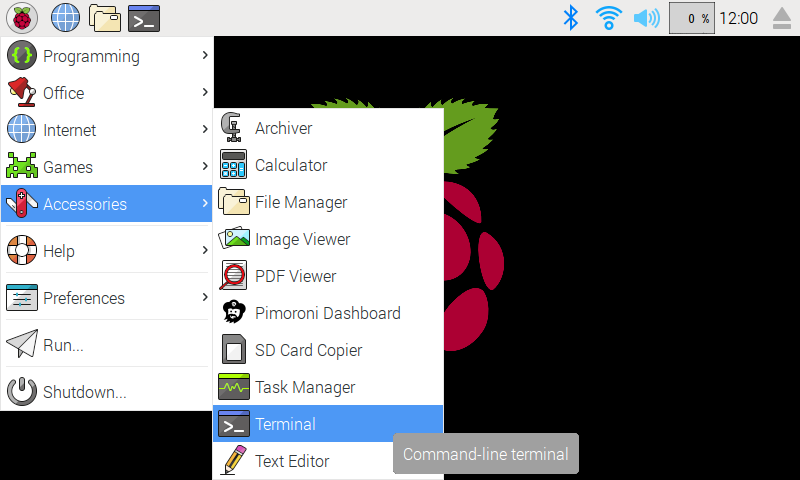https://shop.pimoroni.com/products/blinkt
Eight super-bright RGB LED indicators, ideal for adding visual notifications to your Raspberry Pi on their own or on a pHAT stacking header.
We've created an easy installation script that will install all pre-requisites and get your Blinkt! up and running with minimal efforts. To run it, fire up Terminal which you'll find in Menu -> Accessories -> Terminal on your Raspberry Pi desktop, as illustrated below:
In the new terminal window type the command exactly as it appears below (check for typos) and follow the on-screen instructions:
curl https://get.pimoroni.com/blinkt | bashAlternatively, on Raspbian, you can download the pimoroni-dashboard and install your product by browsing to the relevant entry:
sudo apt-get install pimoroni(you will find the Dashboard under 'Accessories' too, in the Pi menu - or just run pimoroni-dashboard at the command line)
If you choose to download examples you'll find them in /home/pi/Pimoroni/blinkt/.
on Raspbian:
sudo apt-get install python3-blinktother environments:
sudo pip3 install blinkton Raspbian:
sudo apt-get install python-blinktother environments:
sudo pip2 install blinktIf you want to contribute, or like living on the edge of your seat by having the latest code, you should clone this repository, cd to the library directory, and run:
sudo python3 setup.py install(or sudo python setup.py install whichever your primary Python environment may be)
- Guides and tutorials - https://learn.pimoroni.com/blinkt
- Function reference - http://docs.pimoroni.com/blinkt/
- GPIO Pinout - https://pinout.xyz/pinout/blinkt
- Get help - http://forums.pimoroni.com/c/support
- Golang library & examples by Alex Ellis - https://github.com/alexellis/blinkt_go, https://github.com/alexellis/blinkt_go_examples
- Java library by Jim Darby - https://github.com/hackerjimbo/PiJava
- Java library by @HoldYourWaffle - https://github.com/HoldYourWaffle/blinkt4j
- Node.js library by @irrelon - https://github.com/irrelon/node-blinkt
- Rust library by @golemparts - https://github.com/golemparts/blinkt





